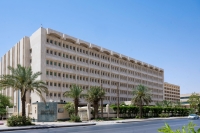
Commercial Courts in the Kingdom of Saudi Arabia are part of the first instant courts of the general judiciary in the Kingdom of Saudi Arabia and are responsible for ruling on all essential or ancillary commercial disputes, as defined by the Law of Procedure Before Sharia Courts. All their judgments are subject to appeal, with the exception of those rendered in cases decided by the Supreme Judicial Council. The Commercial Judiciary used to be affiliated with the Board of Grievances, but in Marc...

Courts in the Saudi Judicial System are classified according to the litigation proceedings into four entities, each of which has its own regulations and legislation. First Instance Courts are of qualitative and spatial jurisdiction. They address disputes of different subject matter and importance, and are thus divided into five courts: Public Courts, Judicial Courts, Personal Status Courts, Labor Courts, and Commercial Courts, dispersed throughout all provinces and governorates of the Kingdom o...

Family Court in the Kingdom of Saudi Arabia is part of the first-instance courts within the general judiciary in the Kingdom. They specialize in addressing all family issues, as specified by the Law of Procedure before Sharia Courts. All their judgments are subject to appeal, with the exception of those rendered in cases decided by the Supreme Judicial Council. Cases addressed within family courts According to Article Thirty-Three of the Law of Procedure before Sharia Courts, family courts sp...

The Entrustment and Liquidation Center 'Infath' provides two types of services: liquidation and consultancy, as it is a specialized and expert entity in the field of liquidation and sales. 'Infath' is a government center with legal personality, administratively and financially independent. It aims to achieve cooperation between judicial and governmental entities in the tasks of liquidation and sale of assets assigned to it by judicial entities or those without pending legal ...

The commercial courts in the Kingdom of Saudi Arabia were established by a decision from the Supreme Judicial Council. They have specialized jurisdiction and are considered first-instance courts. The Law of Commercial Court was established in 2020. The commercial courts have jurisdiction over all lawsuits and violations related to commercial laws, all commercial disputes between merchants, lawsuits against merchants due to their commercial activities, disputes between partners in partnerships, ...

The Enforcement Law in the Kingdom of Saudi Arabia is a set of legal rules governing the work of the enforcement court in the Kingdom. It aims to clarify the role and duties of the enforcement judge, the conditions for accepting enforcement rulings, enforcement in Family Law matters, insolvency, and several other provisions. History of the Enforcement Law in the Kingdom The Enforcement Law was issued in 2012, comprising approximately ninety-eight articles. Before the issuance of this specific l...

The Supreme Judicial Council is the highest judicial authority in the Kingdom of Saudi Arabia. According to the Saudi Law of the Judiciary, the council is responsible for issuing regulations related to the functional affairs of judges after obtaining the King's approval and the appointment, promotion, discipline, delegation, lending, training, transfer, leave, and termination of services of judges, among others. Additionally, the council's responsibilities include establishing, mergin...